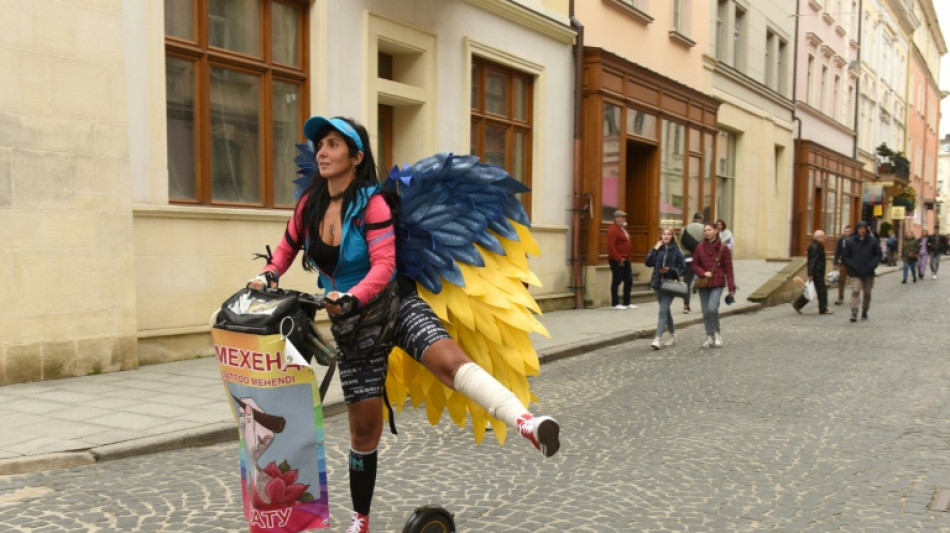

In Ukraine, displaced families replace the tourists
Large blue and yellow wings splayed behind her, Marina speeds gracefully on her scooter in western Ukraine, determined to smile despite little hope of finding tourists wanting a henna tattoo.
"I don't know if there'll be any this summer, because there's a war," said the young angel, who did not wish to reveal her age or surname.
"It's unbearable. My soul aches for my country and my people," she said.
The western city of Lviv attracted 1.5 million tourists last year.
But Russia's invasion has scared off all foreign visitors, even though the cultural hub has remained relatively sheltered from the conflict.
In Lviv today, souvenir shop clients are Ukrainians uprooted by war, or foreign volunteers and journalists.
Most of the city's architectural gems have been boarded up to protect them from Russian air strikes, and many statues are swaddled in fabric or boxed off out of view.
- 'Very difficult' -
Off the city's main square, Taras Hordiyenko waited patiently under a pregnant grey sky for customers to seek a city tour on his golf cart.
"These days it's not business. We don't have tourists, we simply have refugees," he said.
Hordiyenko recounted giving a ride to a mother and son who had managed to escape the besieged city of Mariupol, who told him they were delighted to simply be outside after spending weeks hiding in a cellar.
"It's very difficult to feel this, to hear this," he said.
The war has killed thousands of people, ravaged swathes of the country, and forced millions more to flee their homes since Russia invaded on February 24.
Many of them, women and children for the most part, have fled to or through Lviv.
At a small souvenir market nearby, a handful of stands offered everything from floral scarves and patriotic bracelets to toilet paper printed with the image of Russia's president.
At one of them, 13-year-old Sonia bought a large blue and yellow flag trimmed with tassels.
"I'm buying a Ukrainian flag because it's my nation and I support it," said the teenager, who comes from the capital Kyiv.
"I know it won't help really," she said. But she wanted to hang it in her new bedroom like her brother.
Next to her stood her aunt, who had fled her own home in the embattled eastern city of Kharkiv.
- 'Whole new life' -
Anna, a 36-year-old doctor from the eastern city of Sumy, was also looking for a flag.
She and her two children, aged six and 10, wanted to bring it as a thank-you present for the woman who has volunteered to host them in England.
"We're worried," she said of the upcoming journey.
"It'll be a whole new life -- a new school for the children and a new job for me. I will need to learn the language well."
On an empty terrace off the main square, 20-year-old Vladislav took a break from his new job since escaping the eastern region of Poltava.
"I'm in a lion's suit because I couldn't find another job," said the former delivery boy, a large maned head resting on the table beside him.
"But I really like it. I give people positive energy."
Most of the children he entertained for a small fee also hailed from other parts of Ukraine, he said.
Back in full costume on the cobbles, he crouched down to chat to a timid little boy in a grey and white hat, out for a walk with his mother.
Before long, the mother snapped a picture of her child grinning. His new animal friend pretended to bite off the top of his head.
B.Agosti--IM




